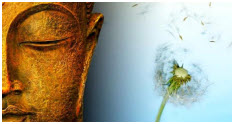Namo Amida Butsu
One of the Japanese words used to express gratitude is "Arigato." The meaning of "Arigato" is "hard to receive," so this particular word conveys genuine appreciation and sincere gratitude.
Whenever and wherever we hear someone say "Thank you," we somehow feel happy and comfortable. As you may know, here in Hawaii, we use the words "Aloha" and "Mahalo." Those two words serve as our greeting words and naturally come from our mouths. Why? I believe it's because we live with the spirit of Aloha and true minds of gratitude and friendship. Hawaiian people refer to this as the "Aloha spirit."
What does Aloha mean? The Aloha spirit is very similar to the teachings of the Jodo Shinshu way of life. ALOHA consists of five letters altogether.
The first is "Akahi," which means "kindness and care." We genuinely care about other people and consistently share our kindness with those around us. A good example is when people come to the church; all of us are welcomed by the kind words and smiles of your members. When we receive this warm feeling of smiles and kind words, we truly feel happy and want to come again! Those smiles, care, and kind words make our lives meaningful. As Hongwanji Sangha, we are always willing to support other people when families face difficult and sad situations. Our temple lives and activities have taught us this essential and sincere heart.
The second is "Lokahi," which means "unity or harmony." Living in society, we may face many different situations. Why? Because we are all different. Different personalities, different interests, different strengths, and so on. However, even with these differences, if we aim for the same goal of understanding the rules and procedures, and through excellent guidance, we can witness great power and wonderful results. When you see a stream from the mountain, the water flows very slowly. However, when those small streams meet other streams, the quantity of water becomes strong, and the power of the water can move many objects, including huge rocks. Another good example is when you play a guitar or ukulele; all strings are of different sizes. But when we make suitable adjustments to those strings, neither too tight nor too loose, we can hear the great sounds of harmony. It is the same in our lives; we are all individuals, but once we make significant adjustments, we can have a harmonious life.
The third is "Oluolu," which means "flexibility." As you may know, our lives are always full of ups and downs. If we lead our lives in a rigid manner, it will become very tight, and we will tire out. Many of the old wooden buildings in Japan were constructed without using many nails. Some of them have been standing for more than 400 years. When you see the common areas of these buildings, it is incredible that they don't use many nails. During summertime, wood shrinks, and during the rainy season, it expands. Yet, those buildings can stand with little spaces between the common areas, even during small earthquakes. Similarly, living in a community, we need to have fair flexibility.
The fourth is "Ha'aha'a," which means "respect." Respecting others is crucial in our lives. If you hold a position of authority, such as a director, and you order others around without knowing the situation, blaming others when they make mistakes does not make you a good leader. Oriental lifestyle is unique, and if you visit the countryside, you may observe their way of relating to one another. It is a vertical relationship type. Young people are taught to respect older people. Even if someone is just one year older than you, you must respect them by using polite and respectful language and attitude. This expression of gratitude and appreciation is a way of acknowledging the outstanding efforts, experiences, and foundations that older generations have provided for the younger generations.
Lastly, there is "Ahohui," which means "patience." Whenever you go to the DMV, most of the time, you have to wait longer than expected. However, getting angry won't change anything. Even if you get angry, others may become angry too, and in the end, you may end up waiting even longer. Instead, we can find other ways to solve the problem, such as engaging in conversation about different subjects. By doing so, we may forget about the passing time, and before we know it, our turn will come. Through patience, we can see things more clearly, which can bring more peace and serenity into our lives.
Our ancestors shared many wonderful values within our community. It wasn't just within the Japanese American society but among all the people living in the State of Hawaii, with a mindset of gratitude. Why? Because they went through complex lives and didn't want their descendants to experience pitiful, painful, and complicated lives. What did they share with our community? Our ancestors shared their courage, joy, wisdom, and thoughtful and sincere minds with each and every one of us. When we deeply contemplate our lives, we realize that many people make our lives precious—our parents, friends, co-workers, teachers, schools, workplaces, restaurants, community, and temple—they all contribute to making our lives meaningful. So, I believe that our daily lives are always interdependent, and through this interdependence, we will learn many essential things, especially "respecting others and having a mindset of gratitude." Once we realize this fact, the warm feeling and mindset of "Arigatai" and "Okagesama-de" truly represent gratitude and appreciation within our hearts. I firmly believe that these are the true teachings of Namo Amida Butsu and the great spirit of Aloha.
Nembutsu is Amida's incredible voice, always encouraging our precious lives and showing us the path of joy and happiness in our hearts. Living in this wonderful place, Hawaii, let us share our true mindset of "Arigato," the true mindset of gratitude, and enjoy our precious lives with our Ohana, guided by the dynamic teachings of the Nembutsu, Namo Amida Butsu.


